
"Our forebears endured and sacrificed so much to protect and conserve this island that we share. Our forebears endured and sacrificed so much to get us to this moment. There's an enormous moral obligation on us now to ensure we maintain their legacy. It's vital we adopt the Rights of Nature. "Chosain agus chaomhnaigh ár sinsir dúlra na tíre leis na cianta. Tá sé de dhualgas orainn a chinntiú nach loitfear í i rith ár seal anseo. Tá sé riachtanach go nglacfar le na Rights of Nature." (Manchán Magan, Writer/Broadcaster)

Uncategorized
The Historical Buddha: A Living Parable for the Age of the Anthropocene The historical figure, Siddhatta Gotama, probably lived and taught between the years 563 and 483 BCE in the foothills of the Himalayas. The iconic story of his birth into an economically and politically influential family in the village of Kapilavatthu and, at the… Continue reading Buddha and the Age of the Anthropocene – Part One
Read more
Uncategorized
We have known for some time that modernity and its exemplary mode of material transmission in the form of capitalism has only progressed by imposing collateral damage on society and nature. Indeed, for Carlisle, Henderson and Hanlon,[i] well-being is the collateral damage. They agree that the science of well-being and its critique are, despite their… Continue reading Mindfulness as Commons – Part Ten
Read more
Uncategorized
CAPITALIST REALISM IN THE 21ST CENTURY In the Western experience, it seems the Kantian-inspired bar on consideration of the sensuous affect as integral to the agency side of pure morality has , it seems, contributed to a disembodied moral life that contributes to an ethos of pleasure and comfort-seeking as a poor substitute for… Continue reading Capitalist Realism – Part Nine
Read more
Uncategorized
Foucault encountered Zen both in his reading and during a brief stay in a Zen monastery practicing the life of a Zen monk. In the spring of 1978 (Davisson 2002), Foucault travelled to Japan to visit a number of Zen centres and was invited by Zen master Omori Sogen, head of the Seionji temple in… Continue reading Foucault, Zen and the Biopolitics of Wellbeing – Part Eight
Read more
Uncategorized
The individual is a relation of opposition Foucault recognized that the convergence of power-knowledge-subjectivity suggested an alternative model of political ethics, ‘or an ethics of resistance to the proliferation of power’ (McGushin 2007:14), a resistance to political power established in the relation of the self to itself[i]. For if it is true that modern disciplinary… Continue reading The Cartesian Moment, The Individual, The Point of Opposition – Part Seven
Read more
Uncategorized
We have known for some time that modernity and its exemplary mode of material transmission in the form of capitalism has only progressed by imposing collateral damage on society and nature. Indeed, for Carlisle, Henderson and Hanlon,[i] well-being is the collateral damage. They agree that the science of well-being and its critique are, despite their… Continue reading Mindfulness as Commons – Part Ten
Read more
Uncategorized
CAPITALIST REALISM IN THE 21ST CENTURY In the Western experience, it seems the Kantian-inspired bar on consideration of the sensuous affect as integral to the agency side of pure morality has , it seems, contributed to a disembodied moral life that contributes to an ethos of pleasure and comfort-seeking as a poor substitute for… Continue reading Capitalist Realism – Part Nine
Read more
Uncategorized
Foucault encountered Zen both in his reading and during a brief stay in a Zen monastery practicing the life of a Zen monk. In the spring of 1978 (Davisson 2002), Foucault travelled to Japan to visit a number of Zen centres and was invited by Zen master Omori Sogen, head of the Seionji temple in… Continue reading Foucault, Zen and the Biopolitics of Wellbeing – Part Eight
Read more
Uncategorized
The individual is a relation of opposition Foucault recognized that the convergence of power-knowledge-subjectivity suggested an alternative model of political ethics, ‘or an ethics of resistance to the proliferation of power’ (McGushin 2007:14), a resistance to political power established in the relation of the self to itself[i]. For if it is true that modern disciplinary… Continue reading The Cartesian Moment, The Individual, The Point of Opposition – Part Seven
Read more
Uncategorized
Fortunately, contemporary regimes of subjectification are not all consuming. Foucault held open a conception of the subject that maintains the possibility of resisting or exercising choices that might be partially severed from a dominant ethic or the neoliberal enterprise culture (Shankar et. al. 2006:1019). Shankar (2006:1019) adds: If this is the case, technologies of the… Continue reading From Askēsis to Resistance as ‘Care of the Self’: technologies of the self – Part Six
Read more